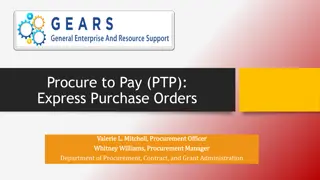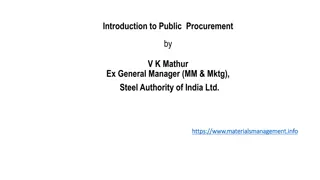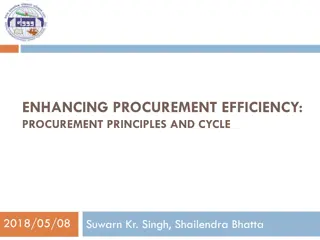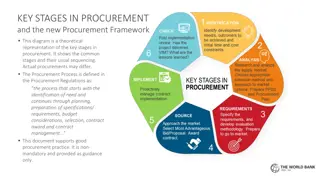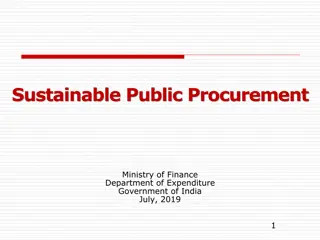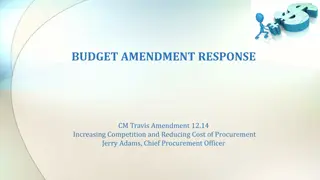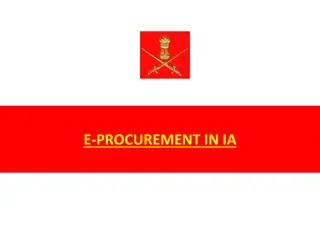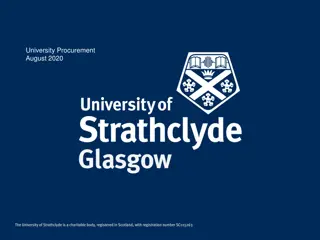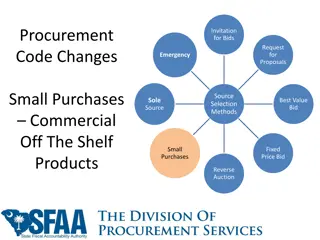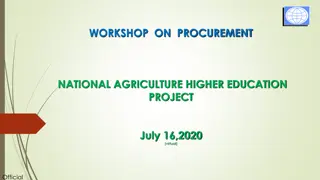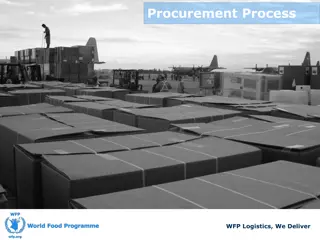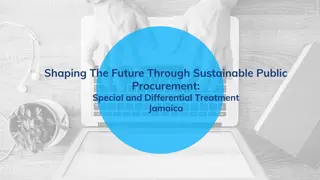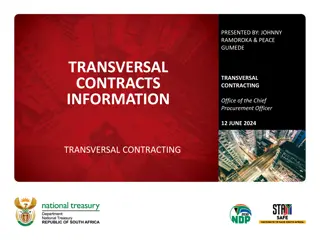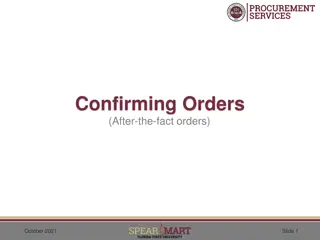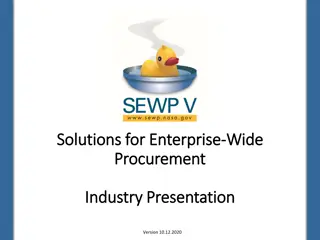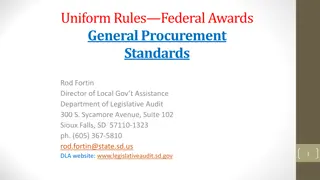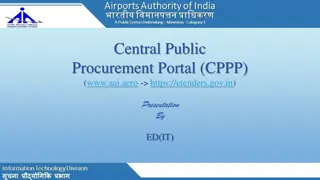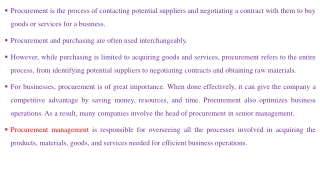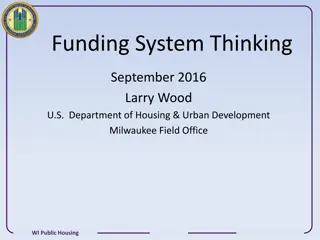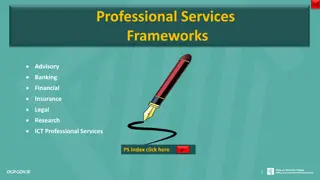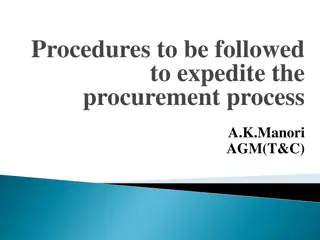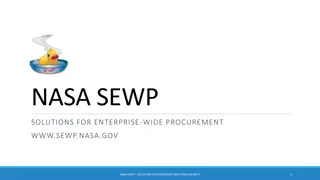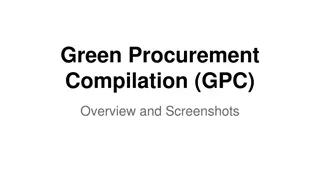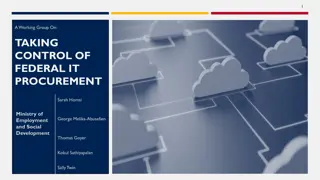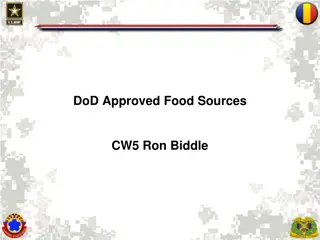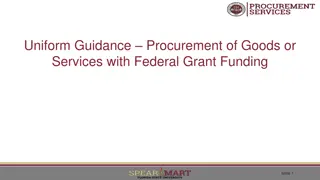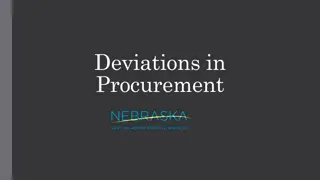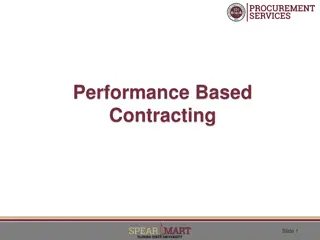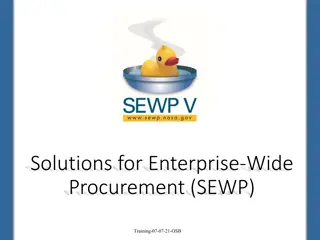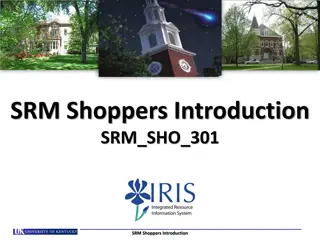Public Procurement Process in Kano: An Overview
The presentation highlights the public procurement process in Kano, focusing on the scope of application, operational procedures, and the impact of legislative frameworks like the Public Procurement Act 2007. It discusses the reforms aimed at enhancing transparency and competition, as well as the role of Budget Monitoring and Price Intelligence Unit in combating corruption.
Download Presentation

Please find below an Image/Link to download the presentation.
The content on the website is provided AS IS for your information and personal use only. It may not be sold, licensed, or shared on other websites without obtaining consent from the author. Download presentation by click this link. If you encounter any issues during the download, it is possible that the publisher has removed the file from their server.
E N D
Presentation Transcript
An Overview of Public Procurement Process in Kano Presented By Engr. Lawan G. Datti, MNSE, COREN Reg. Due Process Bureau, Kano State A One Day Training organized by Kano State Due Process Bureau for Small and Medium Enterprises (SME) at Tahir Guest Palace, Nassawa G.R.A., Kano. 30th SEPTEMBER, 2020
Structure of Presentation Introduction Scope of Application of the Procurement Act Overview of Kano State Public Procurement Reform Programme Vision and Mission Statement Operational jurisdiction and Operational Procedures of the Bureau The Core Mandates of the Due Process Bureau Functions of the Bureau Organisational Structure of the Bureau Relationship with Ministries, Departments and Agencies (MDAs) as well as NGOs & CBOs. The Journey So Far
Introduction At the inception of democratic government in 1999, the Federal Government observed that the contract award system lacked the required competition and transparency in the award process. The World Bank was commissioned in 1999- 2000 to carry out a Country Procurement Assessment Review (CPAR). The CPAR report revealed that 60k was lost to underhand practices out of every N1:00 spent by Government.
Introduction Contd Budget Monitoring and Price Intelligence Unit (BMPIU) was set up in 2001 to mitigate these corrupt practices using Treasury Circulars issued by the Accountant-General of the Federation. Nigeria ratified the United Nations Convention against Corruption (UNCAC) on 24th October, 2004, which calls for preventive measures and the criminalization of the most prevalent forms of corruption in both public and private sectors. The foregoing led to the enactment of the Public Procurement Act 2007, which is modelled after the United Nations Convention on International Trade Law (UNCITRAL) Procurement Model Law.
Scope of Application of the Act The scope of application - Section 15 of PPA, 2007 All Federal Government Procuring Entities (Ministries, Departments and Agencies) All entities outside the foregoing description which derive at least 35% of the funds appropriated or proposed to be appropriated for any type of procurement described in PPA, 2007 from the Federation share of the Consolidated Revenue Fund (CRF). Does not apply to the procurement of special goods; works and services involving national defense or national security Not every procurement by Military or Security Agencies involves national defense or national security
Overview of Kano State Public Procurement Reform Programme Kano State Government established the Due Process Bureau as part of the government s renewed effort to ensure transparency, accountability governance in Public Procurement in the state. Due Process Bureau came into being on account of Kano State Circular No HCS/MIS/S/185/1/95 of 10thJune, 2016. In furtherance of these objectives, Government found it desirable to revise the existing Financial Instructions and Stores Regulations culminating into the issuance of the Due Process Manual which among others stipulates approval limits taking into cognizance of current realities. and good
Overview Cont..... The Due Process Manual equally dwelt on practices surrounding Public Private Partnership (PPP), Direct Labour Approach and Disposal of Public Assets. The Manual is a revised and improved version of the Contract Due Process Policy of Kano State Government that came into being in August 2006, which serves as a veritable instrument for complementing the Due Process Bureau in carrying out its mandates as well as guiding MDAs for compliance. Equally, the revised Manual is Government Public Procurement Act, domesticated to suit the State s peculiarities while incorporating ALTERNATIVE FINANCING AND PROCUREMENT Partnership (PPP) contract procedure not covered in the earlier guidelines. an adopted Federal on Public-Private
Vision Statement An efficient service delivery organ of government, committed to transparency and accountability in Public Procurement as well as Monitoring and Evaluation of State and Local Governments programs and projects sustainability . Mission Statement To lead and coordinate public procurement with openness as well as monitoring and evaluation of all programs, projects and services delivered by all tiers of government and other stakeholders to ensure probity, prudence and competitiveness in service delivery/deliverables .
OPERATIONAL JURISDICTION The Bureau is mandated to regulate public procurement with openness as well as monitoring and evaluation of all programs, projects and services delivered by all tiers of Government. OPERATIONAL PROCEDURES Kano State Due Process Bureau regulates Public Procurement and conducts Monitoring and Evaluation (M&E), of all Projects and Programmes in Kano State.
THE CORE MANDATES OF THE DUE PROCESS BUREAU ARE AS FOLLOWS: Ensuring the application of fair competitive, transparent, value for money, standards practices for the procurement and disposal of public assets and services. The attainment of transparency, competitiveness, cost effectiveness and professionalism in the public sector procurement system. To ensure that procurement procedures and regulation are complied with as determine by the State and Local Government resources. and
MANDATE CONT. To establish and ensure that the application of M & E policies and regulations are complied with in all the State and Local Government Establishments. Identify Organizations (or areas) requiring direct intervention or full takeover of the procurement, that is when capacity is found not to exist or flagrant disregard to the public procurement policy.
FUNCTIONS OF THE BUREAU 1. To check proposed contracts subject to thresholds set by the State Due Process Manual for compliance. 2. Monitor the prices of tendered items. 3. Undertake procurement research and survey. 4. Register Contractors/Service Providers with their particulars. 5. Prepare and update standard bidding and contract documents. 6. Prevent fraudulent and unfair procurement and where necessary recommend appropriate disciplinary actions. 7. Review the procurement and award of contract procedures of every entity. 8. Perform procurement audit. 9. Responsible for monitoring and oversight of public procurement and performance of the projects and programmes.
FUNCTIONS CONT... 10.Saddled to handle Alternative Dispute Resolution (ADR) with a view to achieving value for money to the Government by ensuring full compliance with Due Process. 11.To participate in all the bid opening exercises and regularly conduct due diligence on procurement advertisement placed by organizations to ensure compliance with the Due Process Manual. 12.To identify and report any infractions or gross violation of the Due Process Manual and recommend appropriate punishment on persons involved. 13.To review for compliance the provision, adequacy and effectiveness of established process for the procurement of Works and Consultancy Services.
FUNCTIONS CONT... 14.Managing and Negotiating with Consultants and Contractors on behalf of the Governments. 15.Monitor and maintain a crucial monitoring role to the State Organizations and Local Government Councils through capacity strengthening on procurement matters. 16.Continue engagement with Donor Agencies in the implementation of assisted programmes and support for each others activities procurement reforms. 17.Involve professional bodies in appropriate areas of their operations especially on adjudication where they are to chair the panels. 18.To provide coverage of the Bureau s activities on the State Government Projects and Programmes via Television/Radio stations and online Media. particularly related to
ORGANISATIONAL STRUCTURE The Bureau consists of Eight Departments: 1. Administration & General Services. 2. Planning, Research & Statistics; 3. Local Government Projects; 4. Civil Infrastructure; 5. Building Infrastructure; 6. Power & Energy Infrastructure; 7. Special Assignment; 8. Monitoring and Evaluation.
STRUCTURE CONT It also has four units directly reporting to the Chief Executive as: i. Technical Advisory Unit ii. Legal Advisory Unit. iii. Public Relations Unit. iv. Internal Audit Unit
RELATIONSHIP WITH MINISTRIES, DEPARTMENTS AND AGENCIES (MDAs) The Bureau receives requests from MDAs on Project proposals for its NO OBJECTION Certificate and Evaluation/Vetting of Payment Certificates. It also attends Tenders Board Meetings at MDAs and LGCs levels. It also participates in Bids Opening, Tender Evaluation and preparation of Revised Estimated Total cost (RETC), but only on the invitation by the Organizations. the Projects
RELATIONSHIP WITH MINISTRIES, DEPARTMENTS AND AGENCIES (MDAs) CONT The Bureau transmits its finding in respect of Evaluation/vetting of Payment Certificate to respective Ministries, Departments and Agencies (MDAs) and Ministry of Finance for further necessary action in line with the prevailing regulations. In the case of LGCs, the transmits its finding to Ministry for Local Govt. in compliance with the provision of Local Government Law 2006 (as amended).
RELATIONSHIP CONT ADHOC ASSIGNMENTS: The Bureau receives directives from the Executive Council to conduct Monitoring and Evaluation of some special projects and programmes. MONITORING OF BUDGET IMPLEMENTATION (M & E) The Bureau monitors the implementation of the entire State Budget Performance by MDAs. It also monitors the impact of projects and programmes for future planning and prompts policy decisions. as well as Budget
RELATIONSHIP WITH PUBLIC, (NGOs AND CBOs) IN RESPECT TO PROJECTS IMPLEMENTATION The Bureau attends to any complaint, petition and suggestions from the Public in respect of Project execution for Government appropriate action.
THE JOURNEY SO FAR Draft Kano State Public Procurement, Monitoring and Evaluation Law 2017 is awaiting passage by the Kano State House of Assembly. However, Kano State Due Process Bureau functions in accordance with the extant circulars cited above and the contents of the Due Process Manual. Accordingly, the Bureau issues license to contractors and consultants wishing to practice in Kano State via its portal. www.ksdpb.org.ng. in addition to the kanodueprocessbureau16@gmail.com. Bureau s Email,
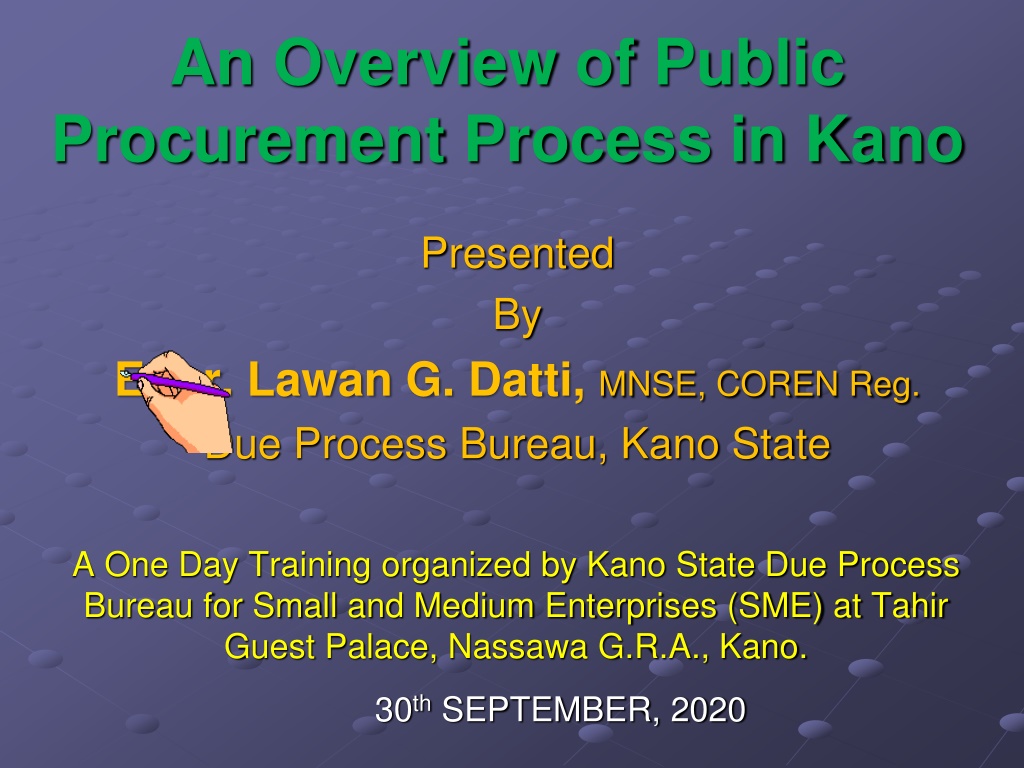

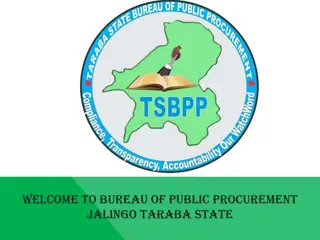
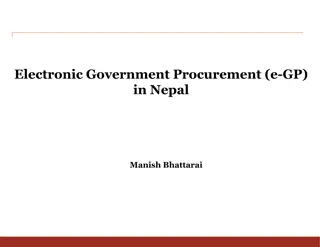
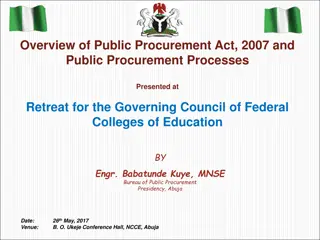

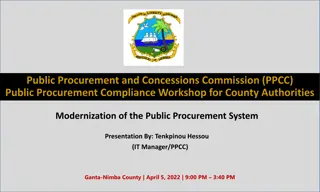
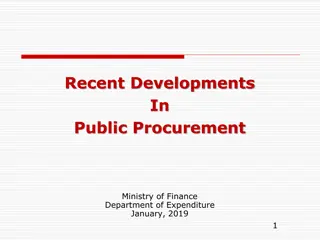
![Comprehensive Overview of Corruption Watch Submission on Public Procurement Bill [B18B-2023]](/thumb/138344/comprehensive-overview-of-corruption-watch-submission-on-public-procurement-bill-b18b-2023.jpg)
